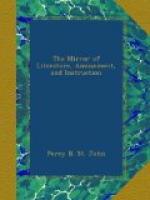On his road to London, whither he had been summoned, from his castle of Cawood, by Henry, to take his trial for high treason, he was seized with a disorder, which so much increased as to oblige his resting at Leicester, where he was met at the Abbey gate by the Abbot and his whole convent. The first ejaculation of Wolsey, on meeting these holy persons, plainly shows that he was fully aware of his approaching end: “Father Abbot,” said he, “I am come hither to lay my bones among you;"[3] and it was with great difficulty that they could get him up the stairs, which it was fated he was never again to descend alive. A short time previous to his death, he thus addressed the Constable of the Tower, who was appointed to convey him to the metropolis:—“Well, well, Master Kingstone, I see the matter how it is framed; but if I had serued God as diligentlie as I haue done the king, he would not haue giuen me ouer in my gray haires;[4] but this is the iust reward that I must receiue for the diligent paines and study yt I haue had to doe him seruice, not regarding my seruice to God, but onely to satisfie his pleasure; I praie you haue me most humblie commended vnto his royal maiestie, and beseech him in my behalfe to call to his princelie remembrance, all matters proceeding between him and mee, from the beginning of the worlde, and the progress of the same, and most especialle in his weightie matter, and then shall his grace’s conscience know whether I haue oflended him or no."[5]
Thus sunk into the grave a man, who was a victim to tyranny, but to a tyranny which he had himself formed; that he was a person far enlightened beyond the period in which he lived no one can presume to doubt. He tended greatly to promote the arts and learning of his country. His personal character displayed as great a variety of opposite qualities, as the fortunes to which he had been exposed; his magnanimity was oftentimes clouded by the greatest meanness, and with an urbanity of manners, he combined an intolerable degree of pride and arrogance; he was frank and generous, but his overwhelming ambition greatly tended to obscure these nobler qualities of his mind, and as he rose, he became haughty and overbearing. His character has been obscured by the envy and partiality of his contemporaries, who have generally endeavoured to load his memory with reproaches. “This Cardinall,” says Holinshed, “was of great stomach, for he compted himselfe equall with princes, and by craftie suggestion got into his hands innumerable treasure; he forced little on simonie, and was not pittiful, and stood affectionate in his owne opinion; in open presence he would lie and saie vntruth, and was double both in speech and meaning; he would promise much and performe little; he was vicious of his bodie, and gaue the clergy euill example; he hated sore the Citie of London and feared it. It was told him that he should die in the waie toward London, wherefore he feared lest the commons of the citie would arise in riotous maner and so slaie him, yet for all that he died in the waie toward London, carrieng more with him out of the worlde than he brought into it, namellie, a winding sheete, besides other necessaries thought meet for a dead man, as a Christian comelinesse required."[6]




